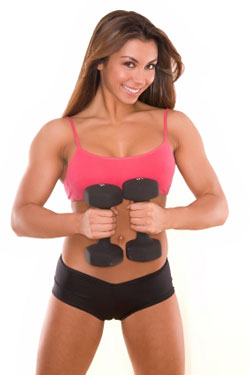Your Exercise Journal
Make weight loss easier

Here's something that you can use to make it easier and faster for you to lose weight. It's the exercise journal.
What's an exercise journal? An exercise journal is a fancy way of saying to keep records of your exercise. It just means to write down what exercise you do.
Do NOT underestimate the benefits of an exercise journal. If you really want to lose weight this is one of the most helpful things you can do.
How do you do it?
Where do you keep track? You can get a computer program. Or there are sites online.
But I think the easiest way, and the best way, is to just write it down in a notebook.
How will it help you?
How is the journal going to help you? Well, let's say you were feeling a little sluggish. Maybe your pants were getting a little tight.
So you think back. The pants used to fit, right? So you get out your book. And you look back over the exercise you were doing when your pants fit you.
You look in the book and you see that you used to take a long walk every week and you stopped. Now you know what to do. You start walking again.
Or maybe you were swimming twice a week. Better start it up again.
It remembers -- so you don't have to.
We forget. We lose track. The notebook keeps track of it for you.
Boost your results
The notebook really pays off in the gym. It can really boost your results when you weight train. How?
Most people show up at the gym with no idea of what they are going to do.
They walk in. Look around. See some dumbells. Do a few curls. See the leg machine. Do some leg presses. See the chest machine...
Or maybe get on the treadmill. And plod along hoping that something might happen.
Well, that's not going to get you anywhere.
Get a plan
Find a good exercise routine. And follow it.
Then you know which exercises you're going to do. You know how many sets. You know how many reps.
When you hit the gym you've got a plan.
Focus your efforts
You grab your notebook. You look at what you did last week on the leg extensions.
"Hmmm..." you say to yourself, "I did 9 repetitions (we'll call them "reps") at 100 pounds last week. So today I'm going to get at least 10 reps."
Now you get yourself seated on the machine. And you start pumping out the reps. And when you get to 7 or 8 or 9 you could quit. You feel like you worked those muscles pretty good.
Don't stop
But you don't stop. No, you go to 10 reps. That's one more than the last workout.
And then you smile to yourself in satisfaction. You say, "Great! I did it!"
Here's what you'll find. A lot of the time, maybe most of the time, you'll be able to do as many repetitions as you did before and probably one or two more.
And without your notebook you wouldn't have done it.
Hit your goal
Without a goal -- without knowing the number you hit last workout -- you'd do some reps and then just stop.
You'd be able to do more. But you wouldn't be motivated to do more.
Without a goal you wouldn't have had anything to shoot for. You wouldn't have told yourself, "I can get 10 reps here."
What does it take to succeed?
Your success in weight loss depends on you having goals to shoot for.
OK. Now, if you were a professional bodybuilder this would all seem very simple and obvious. Arnold Schwarzenegger kept a record of every set and every exercise he ever did. I'll bet he still has those records.
Well, you're not training for Mr. Olympia, right? So what does any of this have to do with you?
A little more each week
This is what it has to do with you: If you did 9 reps last week and you do 10 reps this week it means you are now muscle where you used to be fat.
And what if you did 9 reps last week and the same 9 reps this week? It means you have just as much fat as you did before.
What are you trying to accomplish? Less fat. Do you see how this works?
The payoff
If you want your exercise to pay off you have to do this. You have to do more this week than you did last week. If you want results -- whether it's resistance training or cardio -- you have to do a little more each week.
If you don't you will never get any benefit from the exercise.
And if you do you will have a body you can be proud of.
And your exercise journal is where you start.
Popular articles:
With weight loss, knowledge is power...
If you know these few truths on this page -- and if you apply them consistently in your life...
If you can't stay on it forever and be fit and healthy and strong -- then it's an extreme diet.
Here's the easy way to ruin any slightest chance you have of losing weight...
Can you eat in restaurants and still respect yourself in the morning?
Calorie density is the difference between vegetable soup and a bagel.
Hidden calories that ruin your waistline...
Will it really help to drink water to lose weight?


